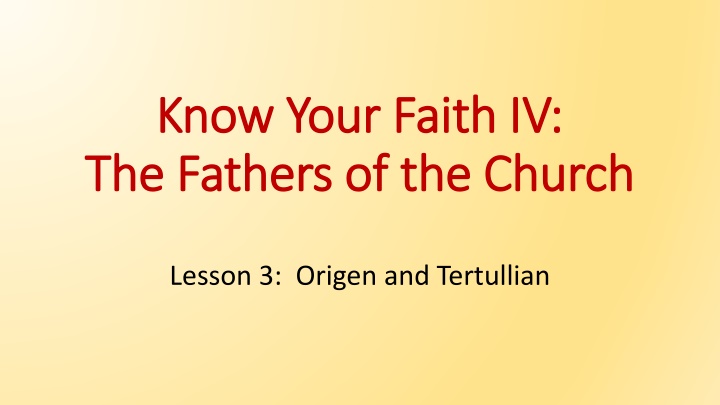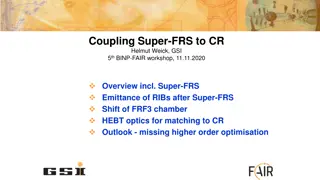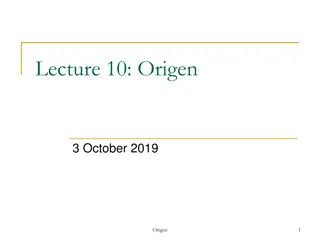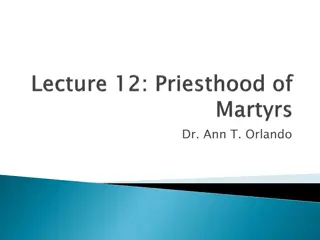
Early Church Heresies: A Brief Overview of Origen, Tertullian, and Controversies
Delve into the teachings and controversies surrounding early Church fathers Origen and Tertullian, along with insights on pagan accusations against Christians, theological debates, and explanations of various heresies like Arianism, Eunomianism, Macedonianism, Apollinarianism, Nestorianism, and Eutychianism.
Uploaded on | 0 Views
Download Presentation

Please find below an Image/Link to download the presentation.
The content on the website is provided AS IS for your information and personal use only. It may not be sold, licensed, or shared on other websites without obtaining consent from the author. If you encounter any issues during the download, it is possible that the publisher has removed the file from their server.
You are allowed to download the files provided on this website for personal or commercial use, subject to the condition that they are used lawfully. All files are the property of their respective owners.
The content on the website is provided AS IS for your information and personal use only. It may not be sold, licensed, or shared on other websites without obtaining consent from the author.
E N D
Presentation Transcript
Know Your Faith IV: Know Your Faith IV: The Fathers of the Church The Fathers of the Church Lesson 3: Origen and Tertullian
Pagan Accusations Against Christians Incest Ritual Human Sacrifice Cannibalism Physical Immorality Atheism Subversiveness
Pro and Cons, Goods and Bads Holy Family Love of Scripture Son of the Church Voracious Reader Philosophy over Theology Unchecked Theories
The Anathema From the 11thCanon of 2d Constantinople (553) If anyone does not anathematize Arius, Eunomius, Macedonius, Apollinarius Nestorius, Eutyches and Origen, as well as their heretical books, and also all other heretics who have already been condemned and anathematized by the holy, catholic and apostolic church and by the four holy synods which have already been mentioned, and also all those who have thought or now think in the same way as the aforesaid heretics and who persist in their error even to death: let him be anathema.
Arianism is a nontrinitarian belief that asserts that Jesus Christ is the Son of God, but is entirely distinct from and subordinate to God the Father. Eunomianism is a heresy that upheld an extreme form of Arianism, which denied not only that Jesus Christ was of the same nature (consubstantial) as God the Father but also that he was of like nature (homoiousian), as maintained by the semi-Arians. Macedonianism is a heresy that, while accepting the divinity of Jesus Christ as affirmed at Nicea in 325, denied that of the Holy Spirit which was seen as a creation of the Son, and a servant of the Father and the Son. Apollinarianism was the heretical belief that Jesus had a human body and lower soul (the seat of the emotions) but a divine mind. Apollinaris further taught that the souls of men were propagated by other souls, as well as their bodies. Nestorianism is a Christological heresy that emphasizes the disunion between the human and divine natures of Jesus. Eutychianism is the heretical belief that Christ's divinity dominates and overwhelms his humanity, as opposed to the Chalcedonian position which holds that Christ has two natures, one divine and one human or the Miaphysite position which holds that the human nature and pre-incarnate divine nature of Christ were united as one divine human nature from the point of the Incarnation onwards.





















